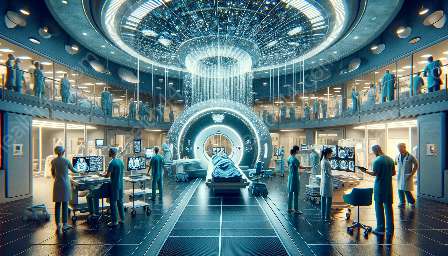Magnetic Resonance Imaging (MRI) has significantly impacted the field of medical imaging, especially in the realm of precision medicine and personalized healthcare. With its non-invasive nature and detailed visualization capabilities, MRI has become an essential tool in diagnosing and treating various medical conditions, including cancer, neurological disorders, and cardiovascular diseases.
Through this topic cluster, we will explore the groundbreaking role of MRI in revolutionizing patient care, from early disease detection to tailored treatment strategies. We will delve into the principles of MRI, its applications in precision medicine, and how it is shaping the future of personalized healthcare.
The Basics of MRI
MRI is a powerful imaging technique that utilizes a strong magnetic field, radio waves, and a computer to generate detailed images of the body's internal organs and tissues. Unlike traditional X-rays and CT scans, MRI does not use ionizing radiation, making it a safer option for patients, particularly those who require frequent imaging studies.
The core principle of MRI involves the alignment of hydrogen atoms within the body when exposed to a magnetic field. The subsequent application of radio waves causes these atoms to emit signals, which are then detected by the MRI machine and used to construct visual representations of the body's anatomy.
Advances in Precision Medicine
Precision medicine aims to tailor medical interventions to individual patients based on their unique genetic, environmental, and lifestyle factors. MRI plays a crucial role in advancing precision medicine by providing detailed information about the molecular and cellular changes associated with specific diseases.
One of the key applications of MRI in precision medicine is its ability to characterize tumors and assess their response to treatment. By employing advanced MRI techniques, such as diffusion-weighted imaging and perfusion imaging, healthcare providers can analyze the microstructural properties and blood flow within tumors, guiding treatment decisions and monitoring therapeutic efficacy.
Furthermore, MRI-based functional imaging, such as functional MRI (fMRI) and magnetic resonance spectroscopy (MRS), enables healthcare professionals to evaluate brain function and metabolism, offering valuable insights for the personalized management of neurological disorders and psychiatric conditions.
Personalized Healthcare and Imaging Biomarkers
MRI serves as a valuable tool for identifying imaging biomarkers that can aid in the individualized assessment of disease progression and treatment response. Imaging biomarkers are specific features or measurements derived from medical images, which can provide quantitative information about disease severity and treatment outcomes.
In the context of personalized healthcare, MRI-based biomarkers contribute to the development of predictive models and treatment algorithms tailored to the unique characteristics of each patient. For instance, in cardiovascular medicine, MRI-based biomarkers, such as cardiac function parameters and tissue characterization, facilitate the personalized risk stratification and monitoring of heart diseases, ultimately influencing clinical decision-making and intervention planning.
Future Directions and Technological Innovations
The ongoing advancements in MRI technology continue to drive the integration of imaging data into precision medicine initiatives. Novel imaging techniques, including multiparametric MRI and radiogenomics, hold promise for unraveling the complex interplay between genomics, imaging phenotypes, and clinical outcomes.
Moreover, the incorporation of artificial intelligence and machine learning algorithms into MRI analysis is poised to enhance the predictive modeling and diagnostic accuracy in personalized healthcare. These intelligent systems can extract intricate patterns from large-scale imaging datasets, assisting clinicians in identifying disease subtypes, predicting treatment responses, and optimizing therapeutic regimens for individual patients.
Conclusion: Impact on Patient Care
In conclusion, the application of MRI in precision medicine and personalized healthcare has redefined the landscape of medical imaging and patient-centered treatment strategies. By harnessing the capabilities of MRI, healthcare providers are empowered to deliver targeted interventions, monitor disease progression, and optimize treatment outcomes based on the unique characteristics of each patient.
As MRI technology continues to evolve and integrate with the principles of precision medicine, the potential for individualized patient care in diverse medical specialties will expand, paving the way for a new era of personalized healthcare.



